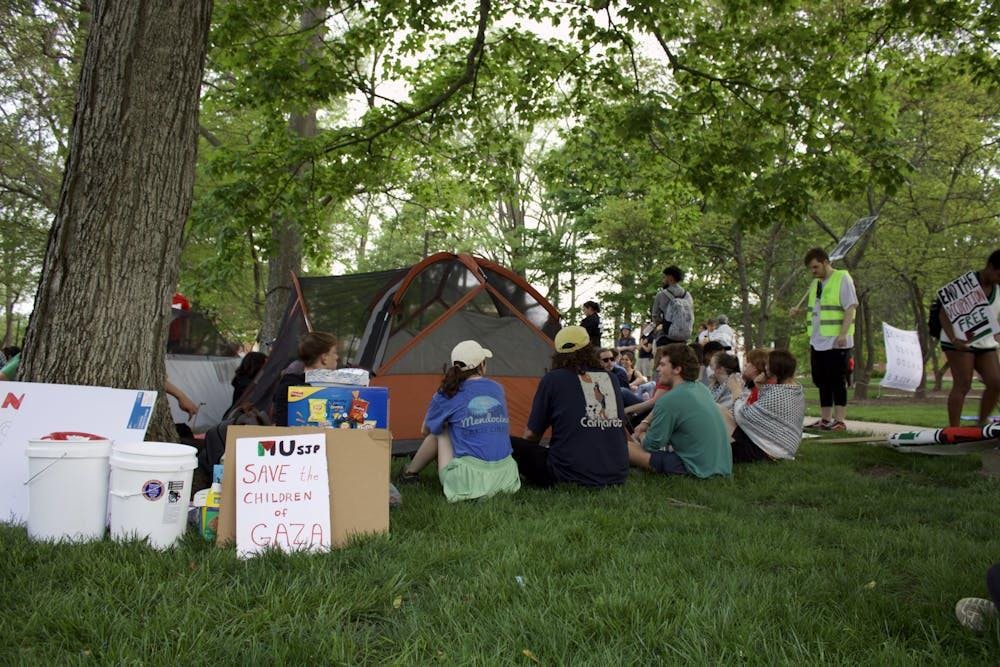Walking home from King Library last October, I stumbled across a scene that shocked me. Strewn around the university seal were dozens upon dozens of miniature Israeli flags, like a field of blue-and-white flowers. Upon checking my phone, I realized that it was the eve of Oct. 7 – exactly a year since Hamas’ attack on Israeli civilians in 2023. This is a day that also marks the anniversary of what is now two years of Israel’s bloodiest campaign in Gaza, which, at the time of publication, has claimed approximately 64,000 innocent Palestinian lives, according to PBS News.
While the events of Oct. 7 were a tragedy for Israelis, every single day since then – and the 77 years since May 14, 1948 – has been a tragedy for Palestinians. The very creation of an Israeli state relied on the forcible expulsion and murder of 75,000 indigenous Palestinians in an event known as the Nakba.
What shocked me was not only the students’ blatant glorification of a colonial state, but how openly they could show their support. For Palestine advocates, on the other hand, showing support can be dangerous.
While expressing pro-Israeli sentiment garners almost no legal repercussions, Palestinian activists endure constant governmental and institutional pushback. International students face acute pressure, many of whom have had their student visas revoked in institutions such as Columbia University and Ohio State University. Most notorious is the case of Mahmoud Khalil, a graduate student at Columbia and a legal permanent resident of the United States who was held for months in an immigrant detention facility simply for protesting the government’s involvement in Israel.
This has far-reaching effects well into Oxford, Ohio. Throughout the years, Miami’s chapter of Students For Justice in Palestine (SJP) has hosted numerous fundraisers for humanitarian aid in Gaza, protests and encampments. Advocacy has been difficult, however, as many students – especially those who have recently immigrated to the U.S. – hesitate to show their support for Palestine in the wake of governmental opposition.
In addition, pro-Palestinian activists across countless institutions have been reported on Internet databases with sensitive information such as their university, address and social media accounts. These databases often defame activists and label them as “terrorist sympathizers,” which can make it difficult to obtain work and education. This includes our very own classmates and peers here at Miami.
Pro-Israeli organizations will often use the flimsy excuse of “terrorism” to censor their opponents, when the majority of Israel’s targets are civilians with no relation at all to Hamas. In fact, it’s estimated that approximately 50% of all Gazans are children under the age of 18. Should they be murdered, tortured and imprisoned in Israel’s campaign against Hamas?
Simply advocating for a marginalized group does not constitute “terrorism” – it’s an exercise of our First Amendment rights.
Miami – and the U.S. as a whole – has an obligation to protect peaceful protest for any cause. When members of our community advocate for Palestine, they aren’t advocating for terrorism or for the senseless murder of Israelis. They are advocating for a group of displaced civilians carpet-bombed en masse by the Israeli government.
They are advocating for an indigenous people who were forcibly expelled from their homes in order to accommodate European settlers. They are advocating for a land that’s been colonized for decades, whose culture and history has been routinely denied by an oppressing class.
This advocacy is supposed to be constitutionally protected for all people regardless of race, age or immigration status. What we’re seeing now – deportations, police crackdowns and campus censorship – are blatant violations of the First Amendment and a misuse of executive power by President Donald Trump. Even if you are not personally affiliated with the Palestinian cause, this should be alarming to anyone who believes in democracy, free speech and the right to peaceful assembly.
The genocide in Gaza isn’t just something happening across the ocean. You don’t have to be Palestinian to be outraged by Israel's unpardonable cruelty; you simply have to be human. While civilians are being routinely bombed, unjustly imprisoned and displaced from their homes, speaking out is the least we can do, no matter the cost.
Enjoy what you're reading?
Signup for our newsletter
Karma Abboud is a sophomore studying international studies and professional writing, as well as Spanish and Arabic. She is an opinion writer for The Miami Student, a mentor in the English Language Program and president of Miami’s Arab Student Association.




